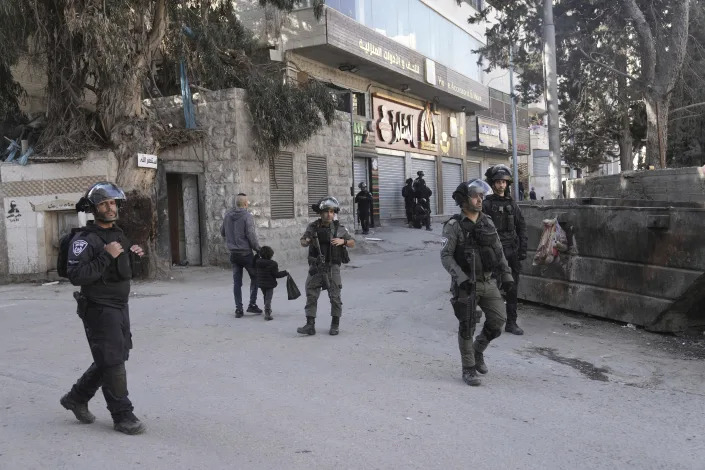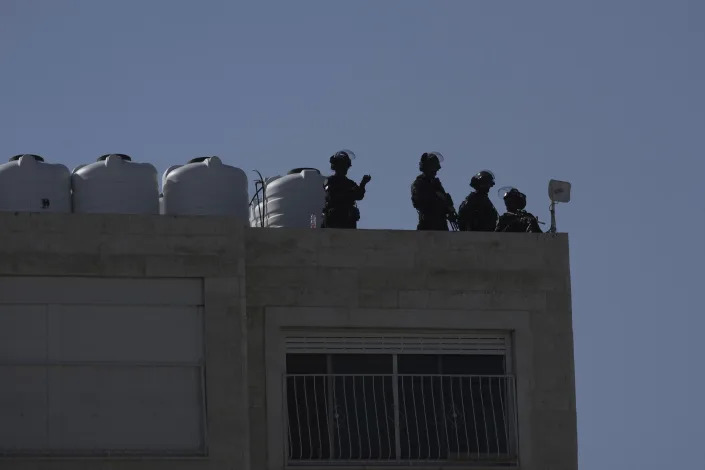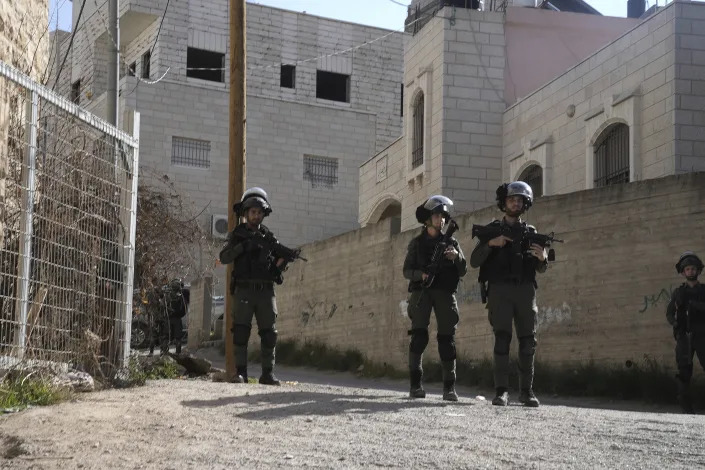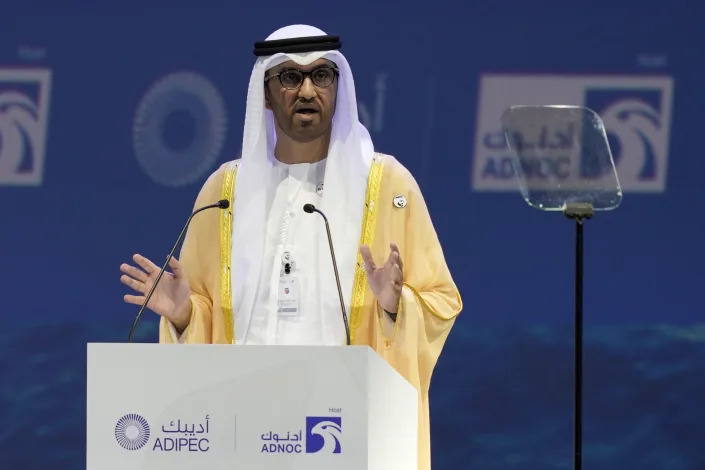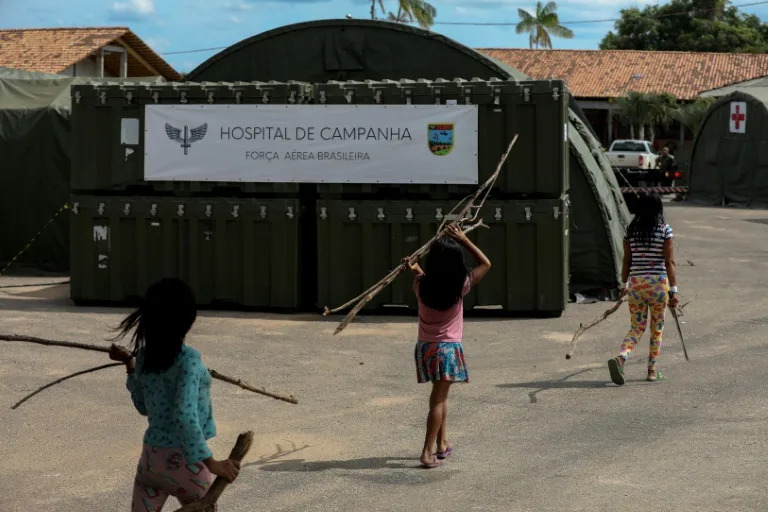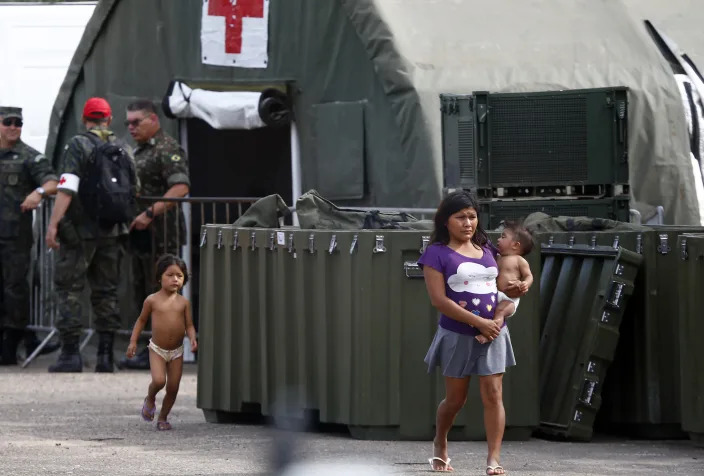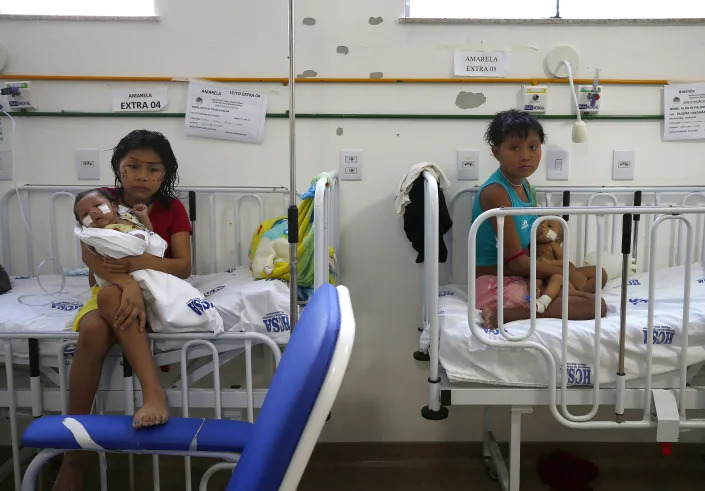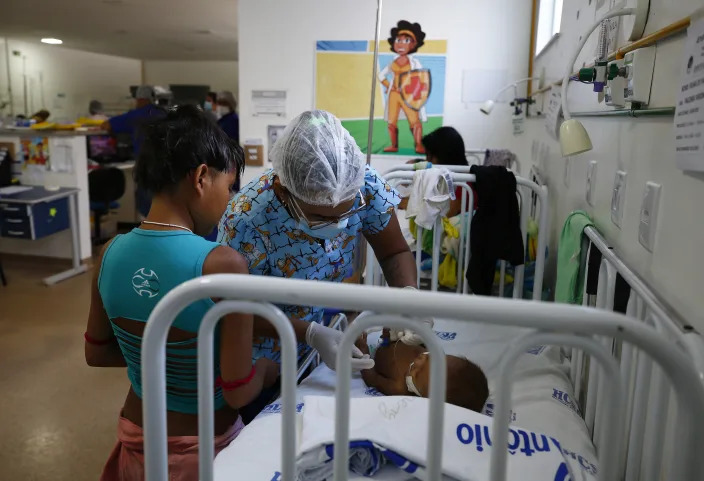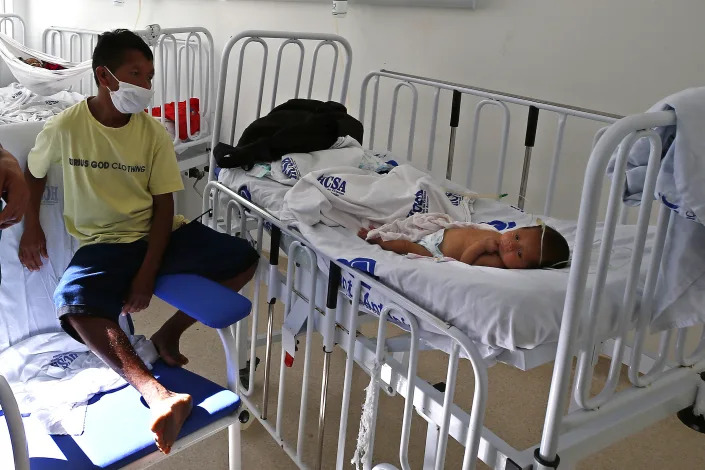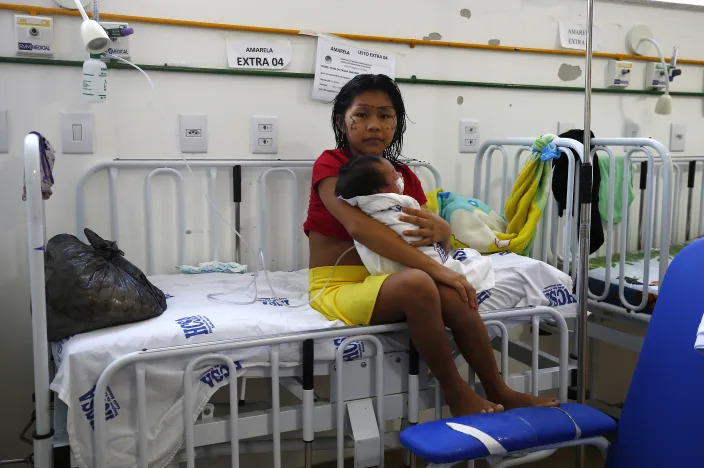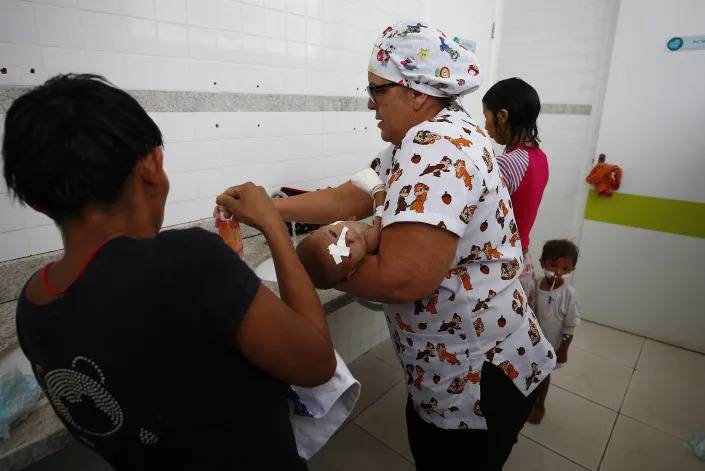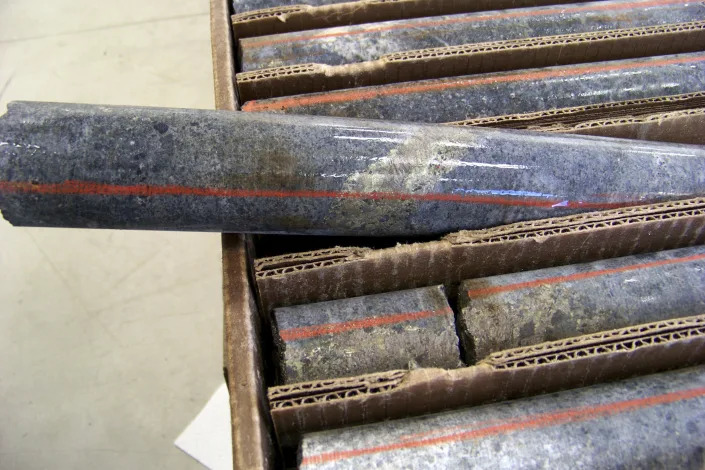
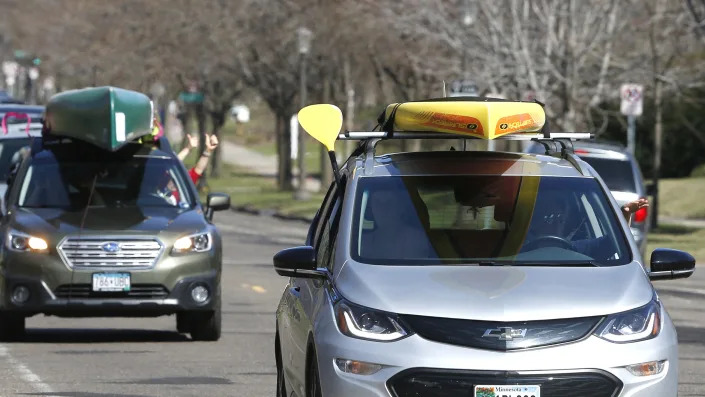
- Supporters of the Campaign to Save the Boundary Waters drive past the residence of Minnesota Gov. Tim Walz as part of an Earth Day drive-in rally to Protect the Boundary Waters Canoe Area Wilderness on April 22, 2020, in St. Paul, Minn. The Biden administration moved Thursday, Jan. 26, 2023, to protect the pristine Boundary Waters Canoe Area Wilderness in northeastern Minnesota from future mining, dealing a potentially fatal blow to the proposed Twin Metals copper-nickel project.
(AP Photo/Jim Mone, File)
STEVE KARNOWSKI
Thu, January 26, 2023
ST. PAUL, Minn. (AP) — The Biden administration moved Thursday to protect northeastern Minnesota's pristine Boundary Waters Canoe Area Wilderness from future mining, dealing a potentially fatal blow to a copper-nickel project.
Interior Secretary Deb Haaland signed an order closing over 350 square miles (900 square kilometers) of the Superior National Forest, in the Rainy River Watershed around the town of Ely, to mineral and geothermal leasing for 20 years, the longest period the department can sequester the land without congressional approval.
The order is “subject to existing valid rights,” but the Biden administration contends that Twin Metals Minnesota lost its rights last year, when the department rescinded a Trump administration decision to reinstate federal mineral rights leases that were critical to the project. Twin Metals, which is owned by the Chilean mining giant Antofagasta, filed suit in August to try to reclaim those rights, and reaffirmed Tuesday that it's not giving up despite its latest setback.
“Protecting a place like Boundary Waters is key to supporting the health of the watershed and its surrounding wildlife, upholding our Tribal trust and treaty responsibilities, and boosting the local recreation economy,” Haaland said in a statement. "With an eye toward protecting this special place for future generations, I have made this decision using the best available science and extensive public input.”
Critics of the project hailed the decision as a massive victory and called for permanent protections for the wilderness. But supporters of Twin Metals said the order runs counter to the administration's stated goal of increasing domestic supplies of metals that are critical to the clean energy economy.
“The Boundary Waters is a paradise of woods and water. It is an ecological marvel, a world-class outdoor destination, and an economic engine for hundreds of businesses and many thousands of people,” Becky Rom, national chair of the Campaign to Save the Boundary Waters, said in a statement.
The proposed underground mine would be built southeast of Ely, near Birch Lake, which flows into the Boundary Waters. The project has been battered by shifting political winds. The Obama administration, in its final weeks, chose not to renew the two leases, which had dated back more than 50 years. The Trump administration reversed that decision and reinstated the leases. But the Biden administration canceled the leases last January after the U.S. Forest Service in October 2021 relaunched the review and public engagement process for the 20-year mining moratorium.
While the Biden administration last year committed itself to expanding domestic sources of critical minerals and metals needed for electric vehicles and renewable energy, it made clear Thursday that it considers Boundary Waters to be a unique area worthy of special protections. A day ago, the administration said it would reinstate restrictions on road-building and logging in the country’s largest national forest, the Tongass National Forest in Alaska.
Twin Metals said it was “deeply disappointed and stunned” over the moratorium.
“This region sits on top of one of the world’s largest deposits of critical minerals that are vital in meeting our nation’s goals to transition to a clean energy future, to create American jobs, to strengthen our national security and to bolster domestic supply chains," the company said in a statement. "We believe our project plays a critical role in addressing all of these priorities, and we remain committed to enforcing Twin Metals’ rights.”
Twin Metals says it can mine safely without generating acid mine drainage that the Biden administration and environmentalists say makes the $1.7 billion project an unacceptable risk to the wilderness. Twin Metals says its design would limit the exposure of the sulfide-bearing ore to the effects of air and water. And it says the mine would create more than 750 high-wage mining jobs plus 1,500 spinoff jobs in the region.
Republican U.S. Rep. Pete Stauber, who represents northeastern Minnesota, condemned the decision as “an attack on our way of life” that will benefit only foreign suppliers such as China that have fewer labor and environmental protections. “America needs to develop our vast mineral wealth, right here at home, with high-wage, union protected jobs,” he said in a statement.
“Ultimately, this sends a chilling message to hardworking Minnesotans who need the widespread economic benefits of mining in our state and sends an even harsher message to the business community that they cannot expect fair treatment in Minnesota or the United States,” the Jobs for Minnesotans coalition of business and labor groups said in a statement.
While Democratic U.S. Rep. Betty McCollum, who represents the St. Paul area, applauded the order, she also warned in a statement that a future administration could reverse the decision.
The 1,700 square mile (4,400 square kilometer) Boundary Waters Canoe Area is the most-visited federally designated wilderness area in the U.S. It draws more than 150,000 visitors from around the world who paddle its more than 1,200 miles (1,900 kilometers) of canoe routes and over 1,100 lakes. According to the Interior Department, it contributes over $17 million annually to the outdoor recreation and tourism economy in northeastern Minnesota. Three Ojibwe tribes exercise treaty rights in the area covered by the moratorium.
The order does not affect two other proposed copper-nickel projects in northeastern Minnesota — the PolyMet mine near Babbitt and Hoyt Lakes and the Talon Metals mine near Tamarack — which lie in different watersheds.
STEVE KARNOWSKI
Thu, January 26, 2023
ST. PAUL, Minn. (AP) — The Biden administration moved Thursday to protect northeastern Minnesota's pristine Boundary Waters Canoe Area Wilderness from future mining, dealing a potentially fatal blow to a copper-nickel project.
Interior Secretary Deb Haaland signed an order closing over 350 square miles (900 square kilometers) of the Superior National Forest, in the Rainy River Watershed around the town of Ely, to mineral and geothermal leasing for 20 years, the longest period the department can sequester the land without congressional approval.
The order is “subject to existing valid rights,” but the Biden administration contends that Twin Metals Minnesota lost its rights last year, when the department rescinded a Trump administration decision to reinstate federal mineral rights leases that were critical to the project. Twin Metals, which is owned by the Chilean mining giant Antofagasta, filed suit in August to try to reclaim those rights, and reaffirmed Tuesday that it's not giving up despite its latest setback.
“Protecting a place like Boundary Waters is key to supporting the health of the watershed and its surrounding wildlife, upholding our Tribal trust and treaty responsibilities, and boosting the local recreation economy,” Haaland said in a statement. "With an eye toward protecting this special place for future generations, I have made this decision using the best available science and extensive public input.”
Critics of the project hailed the decision as a massive victory and called for permanent protections for the wilderness. But supporters of Twin Metals said the order runs counter to the administration's stated goal of increasing domestic supplies of metals that are critical to the clean energy economy.
“The Boundary Waters is a paradise of woods and water. It is an ecological marvel, a world-class outdoor destination, and an economic engine for hundreds of businesses and many thousands of people,” Becky Rom, national chair of the Campaign to Save the Boundary Waters, said in a statement.
The proposed underground mine would be built southeast of Ely, near Birch Lake, which flows into the Boundary Waters. The project has been battered by shifting political winds. The Obama administration, in its final weeks, chose not to renew the two leases, which had dated back more than 50 years. The Trump administration reversed that decision and reinstated the leases. But the Biden administration canceled the leases last January after the U.S. Forest Service in October 2021 relaunched the review and public engagement process for the 20-year mining moratorium.
While the Biden administration last year committed itself to expanding domestic sources of critical minerals and metals needed for electric vehicles and renewable energy, it made clear Thursday that it considers Boundary Waters to be a unique area worthy of special protections. A day ago, the administration said it would reinstate restrictions on road-building and logging in the country’s largest national forest, the Tongass National Forest in Alaska.
Twin Metals said it was “deeply disappointed and stunned” over the moratorium.
“This region sits on top of one of the world’s largest deposits of critical minerals that are vital in meeting our nation’s goals to transition to a clean energy future, to create American jobs, to strengthen our national security and to bolster domestic supply chains," the company said in a statement. "We believe our project plays a critical role in addressing all of these priorities, and we remain committed to enforcing Twin Metals’ rights.”
Twin Metals says it can mine safely without generating acid mine drainage that the Biden administration and environmentalists say makes the $1.7 billion project an unacceptable risk to the wilderness. Twin Metals says its design would limit the exposure of the sulfide-bearing ore to the effects of air and water. And it says the mine would create more than 750 high-wage mining jobs plus 1,500 spinoff jobs in the region.
Republican U.S. Rep. Pete Stauber, who represents northeastern Minnesota, condemned the decision as “an attack on our way of life” that will benefit only foreign suppliers such as China that have fewer labor and environmental protections. “America needs to develop our vast mineral wealth, right here at home, with high-wage, union protected jobs,” he said in a statement.
“Ultimately, this sends a chilling message to hardworking Minnesotans who need the widespread economic benefits of mining in our state and sends an even harsher message to the business community that they cannot expect fair treatment in Minnesota or the United States,” the Jobs for Minnesotans coalition of business and labor groups said in a statement.
While Democratic U.S. Rep. Betty McCollum, who represents the St. Paul area, applauded the order, she also warned in a statement that a future administration could reverse the decision.
The 1,700 square mile (4,400 square kilometer) Boundary Waters Canoe Area is the most-visited federally designated wilderness area in the U.S. It draws more than 150,000 visitors from around the world who paddle its more than 1,200 miles (1,900 kilometers) of canoe routes and over 1,100 lakes. According to the Interior Department, it contributes over $17 million annually to the outdoor recreation and tourism economy in northeastern Minnesota. Three Ojibwe tribes exercise treaty rights in the area covered by the moratorium.
The order does not affect two other proposed copper-nickel projects in northeastern Minnesota — the PolyMet mine near Babbitt and Hoyt Lakes and the Talon Metals mine near Tamarack — which lie in different watersheds.
Biden admin issues 20-year mining ban as it turns to foreign supply chain amid genergy push

Artisanal miners work at a cobalt mine in the Democratic Republic of the Congo on Oct. 12, 2022.
In addition, the mining projects in the Superior National Forest had a project labor agreement in place for the site to be unionized.
"It’s difficult to square the announcement of this significant land withdrawal with the Biden administration’s stated goals on electrification, the energy transition and supply chain security," said National Mining Association President and CEO Rich Nolan in a statement. "At a time when demand for minerals such as copper, nickel and cobalt are skyrocketing for use in electric vehicles and solar and wind infrastructure, the administration is withdrawing hundreds of thousands of acres of land that could provide U.S. manufacturers with plentiful sources of these same minerals."
"In the end, by closing off more and more U.S. land to responsible domestic mining instead of producing minerals here at home, creating high-paying American jobs and mining operations that will be conducted in accordance with the world's most stringent environmental, labor and safety regulations, the administration is looking to stand up operations in the Congo and Zambia," he added.
"It’s nonsensical when you look at where the U.S. wants to be globally as a leader in manufacturing, innovation and climate."
Thomas Catenacci
FOX NEWS
Thu, January 26, 2023
The Biden administration on Thursday announced that it would complete a 20-year withdrawal of 225,504 acres in a northern Minnesota forest area that is home to some of the largest domestic critical mineral reserves.
The action announced by the Department of the Interior (DOI) effectively prohibits mining activity from taking place in the Boundary Waters Canoe Area Wilderness in Duluth, Minnesota, and surrounding area for the next two decades. The agency said it took the action in an effort to protect the local environment and watershed, which environmentalists worried would be contaminated by mining activity.
"The Department of the Interior takes seriously our obligations to steward public lands and waters on behalf of all Americans. Protecting a place like Boundary Waters is key to supporting the health of the watershed and its surrounding wildlife, upholding our Tribal trust and treaty responsibilities, and boosting the local recreation economy," DOI Secretary Deb Haaland said in a statement.
"With an eye toward protecting this special place for future generations, I have made this decision using the best-available science and extensive public input," she continued.
Last year, the DOI canceled two mineral leases held by the firm Twin Metals Minnesota, which had been located in the Superior National Forest located outside the Boundary Waters Canoe Area Wilderness. As a result of that decision and the action Thursday, domestic mining companies will effectively be banned from operating in the region for the foreseeable future and the forest's vast critical mineral resources will be left untapped.
However, Twin Metals' mining project contained about 88% of the nation's cobalt reserves in addition to vast copper, nickel and platinum-group elements. Such critical minerals are vital for various green energy technologies like electric vehicle batteries, battery storage facilities, solar panels and wind turbines, which the Biden administration has aggressively pushed.
For example, an electric vehicle requires 500% more mineral resources than a traditional gas-powered car, while a single onshore wind turbine plant requires 800% more minerals than a typical fossil fuel plant, according to the International Energy Agency.
However, China, other hostile nations and countries with severe human rights concerns dominate the global mineral supply chain.

President Biden has prioritized the green energy push as part of his climate agenda. Critical minerals are vital for green energy technology.
The State Department recently signed an agreement that opens the door to financing mining projects in the Democratic Republic of the Congo (DRC), which mined more than 70% of the global supply of cobalt in 2021 and is home to 3.5 million metric tons of cobalt reserves. But independent investigations conducted in recent years have found that cobalt mines in the DRC employ child laborers.
"If Democrats were serious about developing renewable energy sources and breaking China's stranglehold on the global market, they would be flinging open the doors to responsible mineral development here in the U.S.," House Natural Resources Committee Chairman Rep. Bruce Westerman, R-Ark., said Thursday in a statement. "We cannot have a future of renewable energy without minerals, period — not to mention their necessity to our defense systems, satellites, cellphones and virtually every other advanced technology."
"While Democrats play political ping pong with American industries, China and Russia are laughing straight to the bank," he continued. "The administration's decision to withdraw this mineral-rich area — blatantly targeting one of our country’s most promising mines — is short-sighted, foolish and completely unscientific.
"Unfortunately, President Biden doesn't seem to mind if Minnesota mining communities and the entire American economy pay the price."
Thu, January 26, 2023
The Biden administration on Thursday announced that it would complete a 20-year withdrawal of 225,504 acres in a northern Minnesota forest area that is home to some of the largest domestic critical mineral reserves.
The action announced by the Department of the Interior (DOI) effectively prohibits mining activity from taking place in the Boundary Waters Canoe Area Wilderness in Duluth, Minnesota, and surrounding area for the next two decades. The agency said it took the action in an effort to protect the local environment and watershed, which environmentalists worried would be contaminated by mining activity.
"The Department of the Interior takes seriously our obligations to steward public lands and waters on behalf of all Americans. Protecting a place like Boundary Waters is key to supporting the health of the watershed and its surrounding wildlife, upholding our Tribal trust and treaty responsibilities, and boosting the local recreation economy," DOI Secretary Deb Haaland said in a statement.
"With an eye toward protecting this special place for future generations, I have made this decision using the best-available science and extensive public input," she continued.
Last year, the DOI canceled two mineral leases held by the firm Twin Metals Minnesota, which had been located in the Superior National Forest located outside the Boundary Waters Canoe Area Wilderness. As a result of that decision and the action Thursday, domestic mining companies will effectively be banned from operating in the region for the foreseeable future and the forest's vast critical mineral resources will be left untapped.
However, Twin Metals' mining project contained about 88% of the nation's cobalt reserves in addition to vast copper, nickel and platinum-group elements. Such critical minerals are vital for various green energy technologies like electric vehicle batteries, battery storage facilities, solar panels and wind turbines, which the Biden administration has aggressively pushed.
For example, an electric vehicle requires 500% more mineral resources than a traditional gas-powered car, while a single onshore wind turbine plant requires 800% more minerals than a typical fossil fuel plant, according to the International Energy Agency.
However, China, other hostile nations and countries with severe human rights concerns dominate the global mineral supply chain.

President Biden has prioritized the green energy push as part of his climate agenda. Critical minerals are vital for green energy technology.
The State Department recently signed an agreement that opens the door to financing mining projects in the Democratic Republic of the Congo (DRC), which mined more than 70% of the global supply of cobalt in 2021 and is home to 3.5 million metric tons of cobalt reserves. But independent investigations conducted in recent years have found that cobalt mines in the DRC employ child laborers.
"If Democrats were serious about developing renewable energy sources and breaking China's stranglehold on the global market, they would be flinging open the doors to responsible mineral development here in the U.S.," House Natural Resources Committee Chairman Rep. Bruce Westerman, R-Ark., said Thursday in a statement. "We cannot have a future of renewable energy without minerals, period — not to mention their necessity to our defense systems, satellites, cellphones and virtually every other advanced technology."
"While Democrats play political ping pong with American industries, China and Russia are laughing straight to the bank," he continued. "The administration's decision to withdraw this mineral-rich area — blatantly targeting one of our country’s most promising mines — is short-sighted, foolish and completely unscientific.
"Unfortunately, President Biden doesn't seem to mind if Minnesota mining communities and the entire American economy pay the price."

Artisanal miners work at a cobalt mine in the Democratic Republic of the Congo on Oct. 12, 2022.
In addition, the mining projects in the Superior National Forest had a project labor agreement in place for the site to be unionized.
"It’s difficult to square the announcement of this significant land withdrawal with the Biden administration’s stated goals on electrification, the energy transition and supply chain security," said National Mining Association President and CEO Rich Nolan in a statement. "At a time when demand for minerals such as copper, nickel and cobalt are skyrocketing for use in electric vehicles and solar and wind infrastructure, the administration is withdrawing hundreds of thousands of acres of land that could provide U.S. manufacturers with plentiful sources of these same minerals."
"In the end, by closing off more and more U.S. land to responsible domestic mining instead of producing minerals here at home, creating high-paying American jobs and mining operations that will be conducted in accordance with the world's most stringent environmental, labor and safety regulations, the administration is looking to stand up operations in the Congo and Zambia," he added.
"It’s nonsensical when you look at where the U.S. wants to be globally as a leader in manufacturing, innovation and climate."
